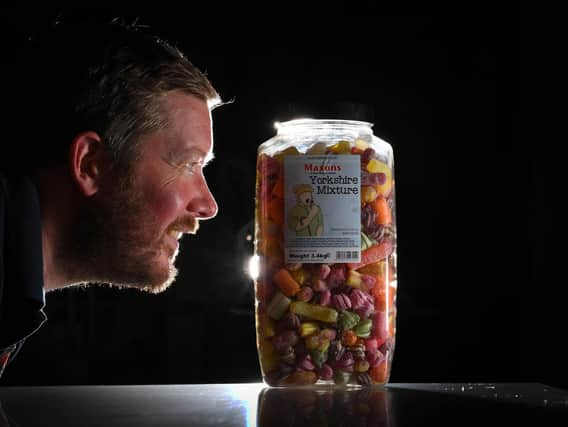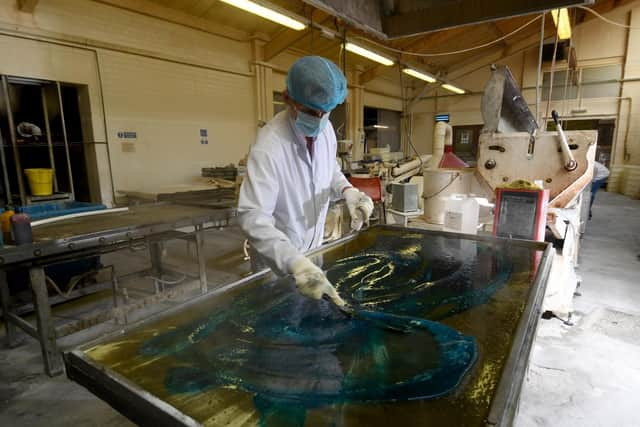Meet Maxons, sweet makers and Sheffield institution known for its Yorkshire Mixture and Black Bullets


Maxons is something of a Sheffield institution. The confectionery producer – known for making sweets such as Yorkshire Mixture and Black Bullets – dates all the way back to back to 1885.
During this time, Henry Dixon began making sweets and toffees and his operation soon became one of the major sugar confectionery manufacturers in Sheffield and Yorkshire. His son, also Henry, would continue the name and traditions into the middle of the 20th century.
Advertisement
Hide AdAdvertisement
Hide AdIn 1927, the MacDonald family also started making sweets in Sheffield. Maxons (Mac and sons) grew to become famous for its Yorkshire Mixture, Pear Drops, Winter Mixture and its variety of old-fashioned boiled sweets.


Ralph Pitchfork, meanwhile, was also involved in the sweet world as a wholesale confectioner. In the 1950s all three businesses came together, also taking on Jesmona Black Bullets, to form the Sheffield company known today as Maxons. Ralph’s son Roger took over and now it is run by the third generation of Pitchforks with Ralph’s grandsons Chris and Richard as joint managing directors. Henry Dixon’s signature sweets, from all the way back in the late to 1800s, mint rock and cherry balsams, are still produced today.
However, speaking with Richard Pitchfork today – as the waft of melted sugar floats through the factory and workers scoop up and weigh mounds of colourful boiled sweets – it is clear that Maxons is entering a new chapter in its history.
“We’ve always said that we own a factory but that it doesn’t always have to make sweets,” he says. So what else can you do with it? Turns out the answer is still very much rooted in the sweet world, but Maxons is expanding and diversifying into new areas. “With boiled sweets, trying to get the younger set in is more difficult because it’s all about jellies and that softer chew, although tastes change as you get older and I’m sure they’ll come back as there’s the nostalgia of being around grandparents and things like that.”
Advertisement
Hide AdAdvertisement
Hide AdRather than waiting for people to age though, Pitchfork launched a new product range, as well as branching out into making alcohol. In 2016, the Charles Butler brand was relaunched with new packaging by Maxons.
The brand was the original part of the company dating back to 1848 that Henry Dixon bought but it died away in the 1960s. Pitchfork had a bit of an epiphany when clearing out this father’s house. “We found a lot of information about it in my dad’s attic,” he says.
“We found original packaging, the brochures that were sent out to customers, and a lot of his long essays that he wrote for his customers. We were looking for a high-end brand to launch for foreign shops, delis and gifting export and this seemed perfect.”
The rebrand started with six classic hard-boiled sweets but soon expanded. “Then we started making toffee and honeycomb,” says Pitchfork. “Then we’ve launched some fudge and chocolate gingers, coconut ice and through lockdown developed a rum and added in some of the sweets – a chocolate honeycomb, clotted cream toffee rum, and an original spiced rum.”
Advertisement
Hide AdAdvertisement
Hide AdDespite branching out into flavoured spirits being a relatively new thing, they have been incredibly well received, already winning Gold and Silver medals in the Luxury Spirit Masters awards. “Part of it is building the brand,” says Pitchfork of the move into booze and high-end deli products. “It’s a way of pushing our name out a little bit, and a way of doing things that is a little bit different.”
Being a local, independent, family-run operation, the company is also keen to link up with other like-minded businesses – a philosophy which saw it co-produce a beer with its neighbours for Yorkshire Day this year. “We worked in conjunction with a brewery just up the road,” says Pitchfork, referring to the Little Mesters Brewery. “We made a Yorkshire Mixture beer. We’re also looking at a bonfire toffee beer and possibly a sherbet lemon one as well. Charles Butler might end up with a beer in for Christmas too.” Maxons has also launched a brand called
Stupidly Sours, which “will very quickly become one of our biggest sellers”, Pitchfork says. “We’ve got pallets and pallets of them going out.” A new trend in young people putting their taste buds to extreme tests with incredibly sour sweets has helped this uptick.
Despite the factory being in family hands for generations, initially Pitchfork and his brother went to work in London for many years. However, when they had had enough and began to have families in 2007, they were drawn back to the family business.
Advertisement
Hide AdAdvertisement
Hide Ad“It would have felt weird for it to just disappear under our generation,” says Pitchfork. “Our production supervisor will retire soon and he’s been here since he was 15. So he has seen me and my brother being born, and then up to us coming into the factory with babies and kids. It’s almost like a second home.”
Despite the new movements into luxury branding, alcohol and super-sour sweets, it’s the classics that still sell in the biggest numbers. “The Black Bullets and Yorkshire Mixture are by far the biggest sellers,” says Pitchfork.
“If you walked around Sheffield in the 80s, you’d know Dixon’s mint rock and cherry balsams. They’re not as popular as they were and part of that is the move away from sweet shops to supermarkets. We weren’t fast enough moving from big jars to bags.”
The Black Bullets have a history attached to the North-East, from where they originated, and are still beloved there today. “They are an absolute staple up there,” says Pitchfork. “It’s one thing you can hang your hat on if you speak to someone from that area and they don’t know who you are. You say, ‘I make Black Bullets’, and they immediately know.”
Advertisement
Hide AdAdvertisement
Hide AdAs it stands, Maxons has one foot in the classic world of boiled sweet-making and another in a more contemporary operation. It’s all about harvesting the power of your grandparents’ old favourite sweets and moving into the future with those same founding principles.
“Boiled sweets have changed,” says Pitchfork. “And the sweet market has changed. However, we definitely do find there’s a lot of people who come to us and like the nostalgic side and also the local family side – people do want to support that.”
Being a small operation, but one that is experienced, also means that Maxons can experiment and try new things to see what works and doesn’t. “We’ve got some good skilled staff,” says Pitchfork.
“We package everything by hand, so our ability to just try a little bit of something is quite good. We can move quite quickly because we’re not a big organisation, so we don’t have to have multiple sign-offs – we can do it ourselves. Even to the point of going, ‘let’s just give something a go’.”
Advertisement
Hide AdAdvertisement
Hide AdDespite the world of boiled sweets not being what it was, Maxons is still producing huge numbers. “For the last couple of weeks we’ve run two production lines at 19 batches a day,” says Pitchfork. “Each batch is about 40 kilos, so you’re probably looking at a tonne and a half a day. When we have all three lines in operation, we’re producing two-and-a-half to three tonnes a day.”
For Pitchfork, the future is about being flexible and adaptable. “It’s just being open to stuff,” he says. “If you close yourself off then you are finished. But I feel confident. There is a healthy future if we can keep moving that way and keep adjusting to the market. People still eat a frightening amount of sweets!”
Comment Guidelines
National World encourages reader discussion on our stories. User feedback, insights and back-and-forth exchanges add a rich layer of context to reporting. Please review our Community Guidelines before commenting.